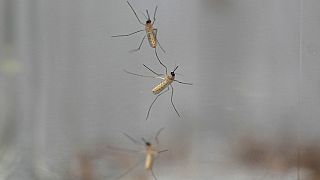Egypt
The Food and Agriculture Organization of the United Nations (FAO) and the Egyptian Agricultural Ministry have joined hands to encourage farmers in rural areas to grow more nutritional crops whilst reducing their environmental impact.
Fifteen schools have been built in the regions of Beni Suef, Aswan, Sohag, Fayoum and Assiut where farmers inherit agricultural practices from their ancestors, growing mostly wheat, corn and barley.
Farmer Mohamed Ragab said through the project they have also learned to turn organic waste into fertilisers instead of burning them.
“Of course the agriculture education that we’ve received from experts, that’s what benefited us most with growing our crops, and how to maintain the cleanliness, and how to make use of the waste, and benefit from it, without harming anyone,” he said.
At the “Junior Farmers Field Schools”, farmers between the ages of 16 and 23 learn to grow and market vegetables and beans.
Potatoes, tomatoes, aubergines, okra, peppers, black eyed peas, sesame, cucumbers and courgette are all examples of plants the farmers are encouraged to grow at the field schools.
FAO’s representative in Egypt, Hussein Gadain, said the project has already had some positive results on production.
“There’s been an increase in the yield as a result of the service provided by the FAO from information and agricultural guidance to farmers,” he said.
“We want to expand this experiment, it initially started on just half an acre, we hope to do it on 100-200-300 acres making us demolish the main problems that face agriculture in Egypt at the moment, such as the fragmentation of agricultural land, and smallholders, which makes farmers unable to make the best use of their yields which affect their income,” said Beni Suef’s governor, Sherif Habib.
Vegetables and beans grown via the project are then taken to the “Nutrition Kitchen schools” where the farmers’ wives are encouraged to optimise the nutritional content of the meals they cook for their families.
“We train them to improve food security and how to overcome malnutrition that they have here. It’s very simple, we do this through simple adjustments to their food habits, that give them an overall much better nutrition,” said Magda Magdy, FAO project facilitator.
The project “Improving Household Food and Nutrition Security in Egypt by Targeting Women and Youth” is funded by the Italian Cooperation Development and hopes to create a legacy that will improve the health of future generations to come.










01:26
Zimbabwe’s Climate-Smart Agriculture: Empowering Farmers through Resilience and Innovation
00:58
Egypt says its working to halt Israel's 'aggression' on Lebanon
01:48
Kung Fu gains popularity among young people in Kenya
01:59
Botswana’s young farmers hope new government will boost agriculture sector
02:10
BRICS: African leaders call for reforms of international institutions
01:27
Egyptian, Russian leaders agree to strengthen ties during Brics summit